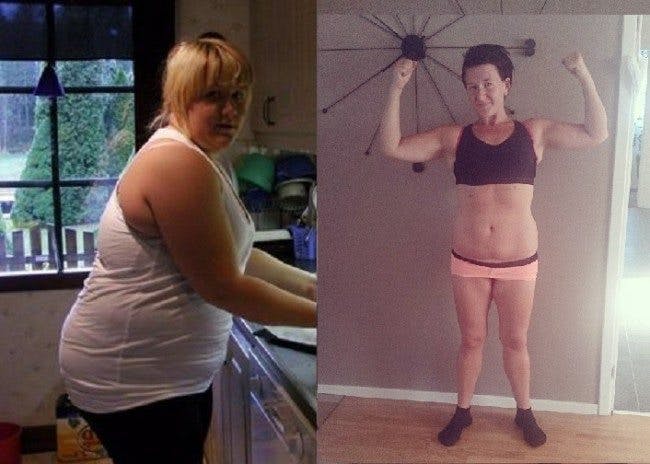Losing 95 lbs in a year with LCHF and intermittent fasting

Before and after
More and more people are combining LCHF with some version of intermittent fasting. This often works great.
I recently got an e-mail from Lina Hassinen. Here’s her story:
The E-mail
This is me, Lina Hassinen, a 25-year-old from southern Sweden!
In the picture to the left you can find a sandwich fan. A girl with a food addiction. I ate, simply because food was always available. The funny thing was that I never viewed myself as big as being as big as I actually was. And nobody really told me “NOW Lina, perhaps it’s time to change your diet! No, because this is not what we Swedes do.
After having understood that I’d never be lean, I sort of gave up, time after time.
I did the banana diet, the starvation diet….. you name it. I did them all. Of course I always got tired of it after a week, sometimes after just one day. It just didn’t work, oddly enough….
After a pregnancy, the scale said 231 lbs (105 kg), and I just felt that whatever… LCHF is supposed to be good. I’ll give it a try… After a week with just boiled cod and green cabbage ( I wasn’t very informed about what to eat), I had lost about 6.5 lbs (3 kg). That’s when I understood that, yes, perhaps this works. I became more and more informed, read books and looked up facts.
Before I knew it I was 136 lbs (62 kg). I had actually managed to lose about 95 lbs (43 kg) in less than a year.
Today I keep fit by keeping to an LCHF diet but lately I have also added intermittent fasting. This works great and I’ve never felt better than I do today!
Thank you for everything!
Lina Hassinen
Congratulations, Lina! Very impressive!
More
Share your story
Do you have a success story you want to share? Send your information, plus before and after photos, to success@dietdoctor.com. It would also be greatly appreciated if you shared what you eat in a typical day, whether you fast etc. More information:
Share your story!